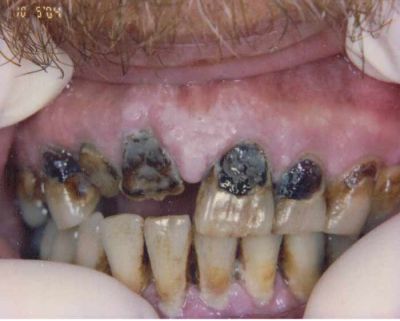Crystal Meth Crack Teeth
- Drinking diet soda for years takes a toll on the teeth that s comparable to years of smoking crystal meth or crack cocaine, according to a new case report from a.
- Meth Mouth Overview. Methamphetamine Use and Oral Health Meth Mouth Dental health care professionals should be aware that methamphetamine use is.
- Oct 21, 2011 Addiction specialist Dr. Eric Braverman, author of The Edge Effect, told Pop Tarts how smoking drugs can affect your teeth. Crystal Meth and Crack can.
- Jan 27, 2015 Crystal meth can cause permanent tooth damage Photo Credit Person having teeth cleaned image by skidme from Fotolia.com. The Partnership for A Drug.


Oral Health Topics
Overview
Methamphetamine Use and Oral Health Meth Mouth
Dental health care professionals should be aware that methamphetamine use is widespread in the U.S. The allure of this drug is that it is cheap, easy to make and the high lasts much longer than crack cocaine 12 hours versus one hour for cocaine. As well as being a potent central nervous system stimulant that can cause permanent brain damage, methamphetamine use has also been associated with severe oral health effects. Dental professionals should be aware of methamphetamine s oral health effects and the treatment considerations for users of this drug.
Street names for Methamphetamine
Meth, Speed, Ice, Chalk, Crank, Fire, Glass, and Crystal
Drug description
Methamphetamine can be smoked, snorted, injected or taken orally. Typically, it is a bitter tasting powder that readily dissolves in beverages. Another common form of the drug is a clear, chunky crystal. This is the form known as ice or crystal meth and it is smoked in a manner similar to crack cocaine. Methamphetamine can also be in the form of small, brightly colored tablets. The pills are often called by their Thai name, yaba.
Mechanism of action
Methamphetamine stimulates release and blocks re-uptake of neurotransmitters called monoamines dopamine, norepinephrine and serotonin in the brain. Several areas of the brain are affected: the nucleus accumbens, prefrontal cortex, and striatum.1
Cerebral effects
By altering the levels of neurotransmitters in the brain, methamphetamine causes feelings of pleasure and euphoria. Methamphetamine is a neurotoxin and potent stimulant, which can also cause cerebral edema and hemorrhage, paranoia and hallucinations. Short-term effects include insomnia, hyperactivity, decreased appetite, increased respiration and tremors. Long term effects can include psychological addiction, stroke, violent behavior, anxiety, confusion, paranoia, auditory hallucination, mood disturbances, and delusions1. Methamphetamine use can eventually cause depletion of monoamines in the brain, which can have an effect on learning. 2, 3
Systemic effects
With high doses there may be an increase in both systolic and diastolic blood pressure due to cardiac stimulation. In addition, methamphetamine may produce arrythmias. Other systemic effects include: shortness of breath, hyperthermia, nausea, vomiting and diarrhea.
Oral effects
The oral effects of methamphetamine use can be devastating. Reports have described rampant caries that resembles early childhood caries and is being referred to as meth mouth. 4, 5, 6 A distinct and often severe pattern of decay can often be seen on the buccal smooth surface of the teeth and the interproximal surfaces of the anterior teeth.4
Be on the lookout for:
Unaccounted for and accelerated decay in teenagers and young adults.
Distinctive pattern of decay on the buccal smooth surface of the teeth and the interproximal surfaces of the anterior teeth.
Malnourished appearance in heavy users, because methamphetamine acts as an appetite suppressant.
What dental health-care providers can do when they suspect methamphetamine use:
Complete a comprehensive oral examination that includes taking a thorough dental and medical history.
Express concern regarding the dental findings.7
If the patient is receptive to a medical consult, have the phone number of a local physician, clinic or substance abuse rehabilitation facility available and be familiar with their protocol, so that the patient can be told what to expect.7
Use preventive measures such as topical fluorides.
Encourage consumption of water rather than sugar-containing carbonated beverages.
Be cautious when administering local anesthetics, sedatives or general anesthesia, nitrous oxide, or prescribing narcotics.
Take opportunities to educate your patients about the risks associated with methamphetamine or any illicit drug use.
References
U.S. National Institute on Drug Abuse. NIDA for Teens. Mind over Matter: Teaching Guide.
Daberkow DP, Kesner RP, Keefe KA. Relation between methamphetamine-induced monoamine depletions in the striatum and sequential motor learning. Pharmacol Biochem Behav 2005;81 1 :198-204. July 29, 2005
Belcher AM, O dell SJ, Marshall JF. Impaired Object Recognition Memory Following Methamphetamine, but not p-Chloroamphetamine- or d-Amphetamine-Induced Neurotoxicity. Neuropsychopharmacology. 2005;30 11 : 2026-34
Shaner JW. Caries associated with methamphetamine abuse. J Mich Dent Assoc 2002;84 9 :42-7.
McGrath C, Chan B. Oral health sensations associated with illicit drug abuse. Br Dent J 2005;198 3 :159-62.
Howe AM. Methamphetamine and childhood and adolescent caries. Aust Dent J 1995;40 5 :340.
Venker D. Crystal methamphetamine and the dental patient. Iowa Dent J 1999;85 4 :34.
Additional Resources.

Meth Teeth. Meth teeth are the result of poor oral hygiene by meth users. Dental problems are common among meth users. Many do not take care of their teeth on a.
Sylvie Bouchard/Shutterstock.com
Before I came to dental school, I worked at a dental clinic that served those with little or no financial resources. I remember vividly a young woman in her twenties who had to have all of her teeth extracted. All of her teeth had extensive decay. She had used methamphetamine for years before coming to see us. We were able to make her dentures. While the dentures worked great, they simply aren t the same as natural teeth.
Commonly known as crystal meth, meth, crank, speed, glass, or over 100 other different names, methamphetamine can literally ruin your mouth in a very short time.
Seven Ways Methamphetamine Ruins Your Teeth
1 – It dries out your mouth. -Methamphetamine directly inhibits saliva flow from the salivary glands. The saliva offers a lot of protection to the teeth, something I recently wrote about in an article called How Saliva Protects Your Teeth. In short, when the saliva stops flowing, the teeth are left without many defenses.
2 – Crystal meth gives the user a prolonged high, which often causes them to pass out. Meth users have a tendency to pass out frequently. When they pass out, they are breathing through their mouth, which dries out the mouth. And without saliva circulating in the mouth, the teeth are at risk.
3 – Meth is acidic by nature. This has been debated. Some people say that meth isn t acidic. Some say it is. Pure methamphetamine is NOT acidic, but most street meth contains acidic byproducts. For example, the most common method of manufacturing meth in the United States is the Red, White, and Blue Method. This method of methamphetamine synthesis produces hydroiodic acid. Other acids can be made as byproducts depending on how the methamphetamine is synthesized.
If only those that manufacture meth knew about the devastating effects of acid on the teeth they d probably be sure to only sell you pure methamphetamine.
4 – Meth users clench their teeth a lot. Many meth users are anxious and paranoid, mostly due to the effects of the drug on their body. When they clench their teeth, they are grinding away valuable tooth structure that has already been weakened due to the other effects of meth mentioned in this article.
5 – Meth gives the user a craving for sugary, carbonated drinks. Since the methamphetamine dries out their mouth, meth users often try to alleviate this side effect by reaching for soda or energy drinks. This only adds insult to injury for their teeth, as pointed out in the article Nine Drinks That Can Dissolve Your Teeth.
6 – Meth destroys the enamel. It does this by causing cavities to form and by releasing toxic chemicals that damage the teeth. In the book Treatment Planning in Dentistry by Stefanac and Nesbit it says:
Meth mouth typically begins with the yellowing of the user s teeth and rapidly deteriorating enamel flaking off from the underlying tooth structure. Repeated use of the drug eventually leaves the user s teeth looking grayish-brown or black stained, decayed to the gum line, and often nonrestorable. The rapid destruction of tooth enamel is thought to be a result of the heated vapors released by toxic chemicals produced while smoking methamphetamine.
7 – Druggies are concerned about how to get their next high, not about their oral health. If you re addicted to meth, then you probably spend a great deal of time, energy, and money supporting this habit. Those with addictions of this nature are unlikely to be seeking routine dental care or even brushing and flossing regularly.
Conclusion
Methamphetamine causes significant harm to the teeth no matter how it is taken. If methamphetamine is smoked, it is much more harmful for the teeth than when injected. The book Primary Preventive Dentistry by Norman Harris says this about how methamphetamine is used:
It is thought that smokers of methamphetamine have worse dental effects, because the chemicals are brought in direct contact with the oral cavity, causing sores and infections. Injectors of methamphetamine do not experience the same severe tooth decay; however, they do experience more severe clenching and grinding. The increased bruxism is attributed to the more powerful effects of the injected drug.
If you or someone you know is addicted to methamphetamine, try to get help as soon as possible. Methamphetamine doesn t just affect the teeth, it affects the whole body.
Here s a good article from Minnesota Public Radio about Ryan Hintz, a recovering meth addict, about how he is overcoming the addiction.
If you have any questions or comments about methamphetamine and dental health, please leave them in the comments below. Thanks for reading.

Meth Mouth